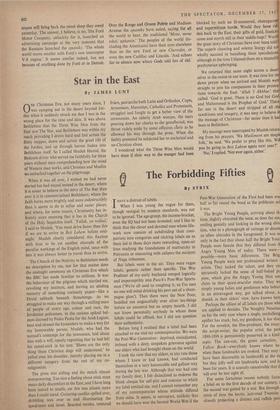Star in the East
By JAMES LUNT ONE Christmas Eve, not many years since, I was camping out in the desert beyond Jor- dan when it suddenly struck me that I was in the wrong place for the time and date. It was above Bethlehem that the Three Wise Men from the East saw The Star, and Bethlehem was within my reach providing I drove hard and fast across the flinty steppes, down and across the great rift of the Jordan, and up through barren Judea into Bethlehem itself. So I called Musleh Hamid, the Bedouin driver who served me faithfully for three years without once comprehending how the mind of Western man works, and Christian and Muslim we embarked together on the pilgrimage.
When it was all over, I wished we had never started but had stayed instead in the desert; where it is easier to believe in the story of The Star than ever it is in commercialised Bethlehem; where the faith burns more brightly and more indestructibly than it seems to do in softer and easier places; and where, for some reason, Christianity has in- finitely more meaning that it has in the Church of the Holy Sepulchre itself. `Yallah, ya wallad,' I said to Musleh. 'You must drive faster than this if we are to arrive in Beit Lahem before mid- night.' Musleh clearly considered this fixation with time to be yet another example of the peculiar workings of the English mind, since with him it was always better to travel than to arrive.
The Church of the Nativity in Bethlehem needs no description by me, nor for that matter does the midnight ceremony on Christmas Eve which the BBC has made familiar to millions. It was the behaviour of the pilgrims which startled me, revolting my instincts, and leaving an abiding memory of something curiously pagan—like a Druid sabbath beneath Stonehenge. As we struggled to make our way through a milling mass of people of every age, colour and race, the Jordanian policemen, in the curious spiked hel- mets decreed by Peake Pasha for the Arab Legion, beat and abused the bystanders to make a way for my honourable person. Musleh, who had the nomad's contempt for the townsman, laid about him with a will, openly regretting that he had left his camel-stick in his tent. 'Blows are the only thing • these Christian dogs will understand,' he yelled over his shoulder, thereby placing me in a different category from the rest of my co- religionists.
The press was stifling and the stench almost overpowering. Too nice a feeling about stink must mean daily discomfort in the East, and I have long been inured to smells, yet this was almost more than I could stand. Guttering candles spilled over, dribbling wax over us and illuminating the tawdriness and tinsel. Bearded monks, tonsured friars, patriarchs both Latin and Orthodox, Copts, Armenians, Maronites, Catholics and Protestants, struggled and fought to get a better view of the ceremonies. An elderly Arab woman, the tears pouring down her cheeks as she genuflected, was thrust rudely aside by some officious cleric as he elbowed his way through the press. When she. feebly protested he subjected her to unclerical and un-Christian abuse.
I wondered what the Three Wise Men would have done if their way to the manger had been blocked by such an ill-mannered, obstreperou and superstitious horde. Would they have ric den back to the East, their gifts of gold, frankir cense and myrrh still in their saddle-bags? Woul the great story of Christmas have ever been told The superb chanting and solemn liturgy did tic wholly succeed in banishing these speculation although at the time I blamed them on a staunchl presbyterian upbringing.
We returned that same night across a desei silver in the moon to our tents. It was time for th dawn prayer when we arrived and Musleh wet straight to join his companions in their prostrt tions towards the East. 'Allah '1 Akhbar,' the called. 'God is great. There is no God but Go( and Mahommed is the Prophet of God.' Then far out in the desert and stripped of all 411 tawdriness and imagery, it was easy to believe i the message of Christmas—far easier than it ha been in Bethlehem.
My musings were interrupted by Musleh returx ing from his prayers. 'We Muslimeen are simpl folk,' he said. 'We prefer to pray like this. Wi you be going to Beit Lahem again next year?'
'No,' I replied. 'Nor ever again, either.'


























 Previous page
Previous page